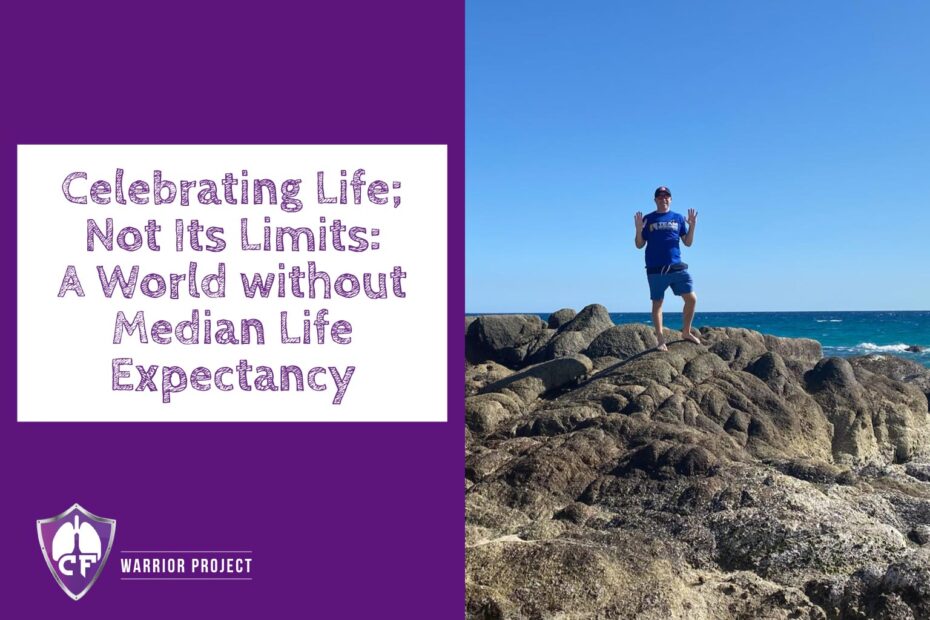I am one of the very few CF warriors/dinosaurs to be born in the early 1970’s who is still alive to tell my story – a story back then filled with flyers, TV commercials and posters that predicted how many years that I would live. . . and what’s worse is these same materials were witnessed by my classmates, my parents and other parents with CF children. One such example was an article from the 1970’s featuring a little girl in the picture with her face just outside of a pool of water trying to catch her breath with the caption: “Cystic Fibrosis is like drowning on the inside.”
These CF promotional tools were used to fundraise and therefore the bleakness of living with the disease was on full display for everyone because organizations needed potential donors to understand the urgency required to find a cure for CF. Still, the impact these materials had on people like me was that we quickly realized that we were not like anybody else. Worse, we weren’t going to live as long as anybody else.
For me, the elephant in the room growing up was always how long was I going to live. My peers asked when I was going to die. Books about those with CF were often written by the parent because the child did not live long enough to write the book in its entirety. A CF parent was never someone with CF who had children but rather a parent who had CF children. It has always been common for adults to ask children what they wanted to do when they grew up. I heard “cowboy, doctor, soldier, etc. . . ., but for me and many others like me, it was simply “I just want to grow up” because the prospect of living beyond my teens seemed implausible. It is difficult to celebrate life when the life you inherit has limits.
I am now 49 years old and a board member, a fundraiser and an absolute admirer of organizations who fight for those of us with cystic fibrosis in order to bring about positive change. In the past few decades, organizations have worked hard to bring scientific breakthroughs, to allow financial flexibility for patients and their families and have become outlets for emotional wellbeing. During that same time, various organizations have measured their success by one number in particular. . . the median life expectancy of cystic fibrosis patients.
While that statistic has been a critical measuring stick for those working at organizations helping to fight cystic fibrosis, it has also become a traumatizing statistic for anyone whose family is affected by the disease. When I was about ten years old, I unintentionally found the term cystic fibrosis in the encyclopedia and learned my life expectancy then was 25 years. Later, I would learn that it was only 16 years when I was born. While some would say a nine-year increase in 10 years is miraculous, all I could see was a shortened life with a limited number of dreams and that led me to dealing with a lifetime of severe anxiety and clinical depression. Again, how can one celebrate a life with limits?
As a CF adult, I have learned to use life expectancies and bleak prognoses as motivation to keep fighting but as a child those statistics absolutely haunted me. I believe it is time to stop publishing and harping on life expectancies for those of us with this disease.
The year is now 2023 and times have changed. People are living longer thanks to medical breakthroughs, CF parents can now actually be a parent with cystic fibrosis and when someone with this disease is asked what they want to do when they grow up, they can actually pick whatever profession they want without the concern that they won’t live that long.
There is still plenty of work to do in the cystic fibrosis community as many patients and their families have difficulty affording insurance to cover their meds and hospital stays, a small portion of the population is still without a CFTR modulator that can help them and the entire community still awaits a cure for cystic fibrosis.
While we continue to focus on fighting these physical symptoms of the disease, it’s very important that we transform the mental outlook to ease the pressure of battling CF.
It’s time we stop concerning ourselves with how long we are supposed to live and rather grade ourselves on how we live with however much time we are blessed to receive.
It’s time to celebrate life; not its limits.
Live your dreams and love your life,
Andy
